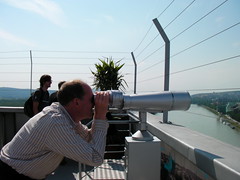 Perhaps fitting that during my return from Slovakia yesterday, I had the Current Podcast playing an episode that examined the career of journalist Joe Schlesinger. Joe was born in Bratislava, on one of the streets that I’ve been walking for the past five days. He was and is the epitome of the foreign correspondent, with that tone of voice and cadence that just naturally makes you listen. He reported from war zones throughout the world, and places that at the time, few people had ever heard from.
Perhaps fitting that during my return from Slovakia yesterday, I had the Current Podcast playing an episode that examined the career of journalist Joe Schlesinger. Joe was born in Bratislava, on one of the streets that I’ve been walking for the past five days. He was and is the epitome of the foreign correspondent, with that tone of voice and cadence that just naturally makes you listen. He reported from war zones throughout the world, and places that at the time, few people had ever heard from.
By the end of the interview Anna-Maria asks Joe what he thinks about journalism now as compared to then. Despite beingContinue reading “The Foreign Correspondent”
 I wrote a piece for the Guardian on the Dutch vote during last week’s European Parliamentary elections. Here’s an excerpt:
I wrote a piece for the Guardian on the Dutch vote during last week’s European Parliamentary elections. Here’s an excerpt: D tells me this as we drive back from a day trip to Austria today, as we drive past dozens of dusty, abandoned booths and buildings. The sign reads “Slovakia” with the EU blue around it, and the speed limit through the mess of former guard posts reads “40”.? In less then 2 minutes we’re back to regular speed, back in Slovakia, and over a border that when it comes down to it, no longer exists.? And although plenty of people young and old have stories of how the border crossing used to be, you can bet they would all think it insane to
D tells me this as we drive back from a day trip to Austria today, as we drive past dozens of dusty, abandoned booths and buildings. The sign reads “Slovakia” with the EU blue around it, and the speed limit through the mess of former guard posts reads “40”.? In less then 2 minutes we’re back to regular speed, back in Slovakia, and over a border that when it comes down to it, no longer exists.? And although plenty of people young and old have stories of how the border crossing used to be, you can bet they would all think it insane to You’ve heard me mention one of my top 5 programs to listen to, NPR’s StoryCorps podcast. Today I listened to a beautiful edition of the program dedicated to letting individuals and pairs of people tell their stories to us the public and to each other.? This particular edition featured, in part 1 – A mother who served in the US military in Iraq
You’ve heard me mention one of my top 5 programs to listen to, NPR’s StoryCorps podcast. Today I listened to a beautiful edition of the program dedicated to letting individuals and pairs of people tell their stories to us the public and to each other.? This particular edition featured, in part 1 – A mother who served in the US military in Iraq  Today some of my ambitious colleagues asked if I wanted to sit in and give my 2 cents at a meeting regarding the future of television programming (on Dutch public TV specifically).? What started as a meeting of 4 warped into a meeting of 8, with various people coming from TV, radio, documentary and backgrounds of all kinds.? Everyone got a chance to say their piece regarding what they think the future of television should be, what their media consumption habits are, and what kind of programs they would like to see.
Today some of my ambitious colleagues asked if I wanted to sit in and give my 2 cents at a meeting regarding the future of television programming (on Dutch public TV specifically).? What started as a meeting of 4 warped into a meeting of 8, with various people coming from TV, radio, documentary and backgrounds of all kinds.? Everyone got a chance to say their piece regarding what they think the future of television should be, what their media consumption habits are, and what kind of programs they would like to see.